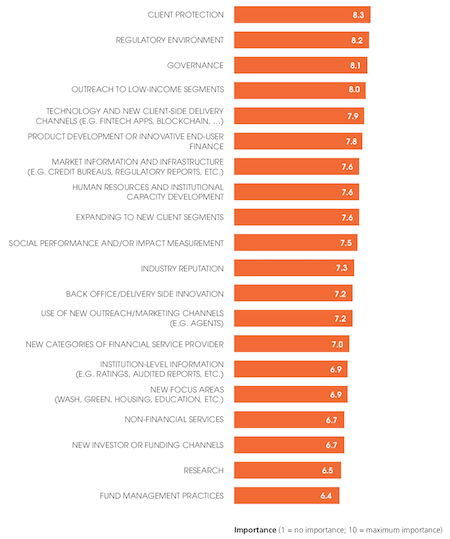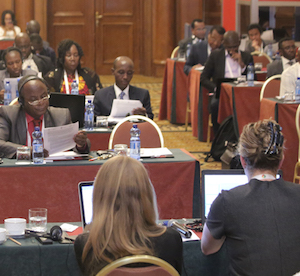This conference offers the opportunity to share information on how to accelerate the outreach of microinsurance services to foster
Category: Risks
MICROFINANCE PAPER WRAP-UP: “Using Satellite Data in Financial Inclusion;” published by CGAP
By Maria Fernandez Vidal and Peter Bull, published by CGAP (Consultative Group to Assist the Poor), July 2019, 24 pages, available at https://www.cgap.org/sites/default/files/publications/2019_07_Technical%20Guide_Using_Satellite_Data.pdf
In this paper, the authors provide guidance on how satellite data and data analytics can be used by financial service providers (FSPs) to extend the reach
MICROCAPITAL BRIEF: Bank of Ghana Revokes Licenses of 23 Microfinance Banks Due to Insolvency
The Bank of Ghana (BOG) recently revoked the licenses of 23 microfinance banks (MFBs) that became insolvent and remained so despite being given additional time to seek fresh capital from investors. The MFBs reportedly will be able to
MICROCAPITAL BRIEF: Government of India May Waive Microfinance Debt for “Small Distressed Borrowers”
The Indian government reportedly is planning a debt waiver program for “small distressed borrowers” under the country’s insolvency and bankruptcy code. While the criteria under which a borrower would qualify for the program remain under discussion, potential parameters include
MICROCAPITAL BRIEF: Government of Malaysia Launches National Strategy for Financial Literacy
Malaysia recently launched a National Strategy for Financial Literacy for the years 2019 through 2023. The strategy outlines the following priority areas:
MICROFINANCE PAPER WRAP-UP: “Influence of Ownership Type and CEO Power on Residual Loss: Evidence From the Global Microfinance Industry;” by Leif Atle Beisland, Daudi Pascal Ndaki, Roy Mersland
Published by Nonprofit and Voluntary Sector Quarterly; May 2019; 40 pages; available at: https://www.researchgate.net/publication/333175215_Influence_of_Ownership_Type_and_CEO_Power_on_Residual_Loss_Evidence_From_the_Global_Microfinance_Industry
Based on data from 374 microfinance institutions in 76 countries, the authors seek to identify “whether the agency cost component referred to as ‘residual loss’ differs between non-profit and shareholder-owned microfinance organizations and whether such
MICROFINANCE PAPER WRAP-UP: “Toward Better Resilience During the War Crisis: Case Study of Three Microfinance Institutions in Yemen,” Published by the Macrothink Institute
By Nashwan Sabrah and Nabeel T Alsohybe, published by the Macrothink Institute, June 2019, 17 pages, available at http://www.findevgateway.org/library/toward-better-resilience-during-war-crisis-case-study-three-microfinance-institutions-yemen
Since 2015, conflict in Yemen has impacted businesses in the country, driving actors in the microfinance industry to adapt the services they provide. Based on interviews with 11 individuals working at three microfinance institutions (MFIs) in the country, this study describes some of the challenges confronted by the MFIs and
MICROFINANCE EVENT: 9th Annual Uniglobal Central Asian and Caucasus Microfinance Forum; October 3 – 4, 2019; Tbilisi, Georgia
This conference will focus on “transparency, regulations, transformation of [the] microfinance industry, social reporting standards, investment, risk and asset management, and innovation” in the Central and Western Asia. Sessions will cover topics including
SPECIAL REPORT: Practitioners, Researchers Among Those Sought to Participate in 2019 “Financial Inclusion Compass” Survey of Microfinance Trends
The European Microfinance Platform (e-MFP), an NGO in Luxembourg with over 130 members, recently began accepting responses to the survey from which it will build second annual Financial Inclusion Compass. The 2018 edition of the Compass identified the following as the most important trends: Client Protection; Regulatory Environment; Governance; Outreach to Low-Income Segments; and Technology & New Delivery Channels. In the New Areas of Focus section
European Microfinance Platform (e-MFP), an NGO in Luxembourg with over 130 members, recently began accepting responses to the survey from which it will build second annual Financial Inclusion Compass. The 2018 edition of the Compass identified the following as the most important trends: Client Protection; Regulatory Environment; Governance; Outreach to Low-Income Segments; and Technology & New Delivery Channels. In the New Areas of Focus section
SPECIAL REPORT: The “Financial Inclusion Compass 2019”: e-MFP to Launch 2nd Annual Survey of Financial Inclusion Trends
Trends trends, trends, everywhere. Discussions about the trends underway in the financial inclusion sector dominate workshops and panel debates at all major conferences, as experts peer into crystal balls and extrapolate from what is currently happening in the sector to predict what will change in the years to come.
trends, trends, everywhere. Discussions about the trends underway in the financial inclusion sector dominate workshops and panel debates at all major conferences, as experts peer into crystal balls and extrapolate from what is currently happening in the sector to predict what will change in the years to come.
But too often, this sort of discussion just exists in that moment, for an audience in the room, and then vanishes into the ether. What if there was a more structured way to ask stakeholders what they see as the current and future trends, capture those responses and track them over time?
The  inaugural European Microfinance Platform (e-MFP) survey of financial inclusion trends was launched as a response to this question during the summer of 2018. The Financial Inclusion Compass 2018 – the paper that presented the findings from that survey of e-MFP members and other financial inclusion stakeholders – was released during European Microfinance Week (EMW) 2018 last November.
inaugural European Microfinance Platform (e-MFP) survey of financial inclusion trends was launched as a response to this question during the summer of 2018. The Financial Inclusion Compass 2018 – the paper that presented the findings from that survey of e-MFP members and other financial inclusion stakeholders – was released during European Microfinance Week (EMW) 2018 last November.
The Compass was conceived as a way to leverage e-MFP’s unique position as a knowledge hub within the sector, including by distilling some of the best debate from the annual EMW workshops. It gave a wide array of practitioners, investors, donors, academics and support service providers the opportunity – via a mixed-methodology online survey – to: (1) score and describe the importance of various Trends; (2) evaluate and give opinions on New Areas of Focus; and (3) provide open-ended qualitative input on sector challenges, opportunities, medium-term forecasts, financial service providers of the future, a policy-making “wish list” and longer-term hopes.
The results of the survey are
MICROFINANCE EVENT: Africa Global Payment Summit; August 27 – 28, 2019; Johannesburg, South Africa
The 2019 Africa Global Payment Summit will cover “developments in payments and wallets as well as the larger, cross-border regional platforms that are transforming the African payments landscape.” Sessions with address regulatory best practices, bringing together the 16 central banks of the Southern African Development Community to identify what an enhanced global payment system for the region
MICROCAPITAL BRIEF: Myanmar Lowers Microloan Interest Rate Cap from 30% to 28%, Compulsory Savings Minimum from 15% to 14%
The Ministry of Planning and Finance of Myanmar reportedly decreed recently that microfinance institutions (MFIs) must start charging less for loans immediately. Daw Phyu Yamin Myat, the general secretary of the 107-member Myanmar Microfinance Association, reportedly stated that a minimum of
MICROCAPITAL BRIEF: MASLOC Halves Interest Rates to 12% as Bank of Ghana Starts $172m Bailout of Microfinance Industry
The Ghanaian government’s Microfinance and Small Loans Centre (MASLOC), a provider of retail and wholesale microcredit, recently received approval to cut its annual interest rate from 24 percent to 12 percent. Meanwhile, the institution has received GHC 75 million (USD 14 million) from the government to expand its operations. This expansion includes a plan to have offices in 70 percent of the nation’s districts by the end of 2019 and
MICROCAPITAL BRIEF: Mobisol, Provider of Pay-as-you-go Solar Systems in East Africa, Files for Insolvency
Mobisol, a Germany-based provider of solar-powered products in Kenya, Rwanda and Tanzania, recently completed a court filing to enter a period of “self-administered insolvency.” According to a press release from the firm, “Mobisol is going to continue serving its customers and partners…without any interruption.” The firm’s managers are working with potential investors as part of a plan to bring in more cash and
MICROCAPITAL BRIEF: Microfinance Institutions (MFIs) in Nicaragua Lose $30m During Year of Political Turmoil
La Cámara de Microfinanzas, a network of 27 microfinance institutions (MFIs) in Nicaragua that is also known as ASOMIF, recently reported that its members lost USD 30 million during 2018. Among the reasons cited for the decline are the country’s political unrest that began in April 2018 and
MICROCAPITAL BRIEF: Global Index Insurance Facility (GIIF) Offers $270k in Prizes to Insurers in South, East Asia via Agriculture Insurtech Innovation Challenge DEADLINE EXTENDED
Through May 15 (formerly April 30), providers of technology services that support agriculture index insurance in South Asia and East Asia may apply for nine prizes of up to USD 50,000 each. Index insurance is a mechanism by which covered individuals are reimbursed for losses when weather or other conditions exceed pre-established limits, rather than based on individuals’ losses.
The competition is divided into the following themes: (1) data and analytics; (2) sales and distribution; and (3) premiums and claims. The winners will be selected after the finalists
SPECIAL REPORT: Short-form Applications for $113k European Microfinance Award for Climate Resilience Due April 9
With  a new two-stage application process, the European Microfinance Platform (e-MFP) has opened the 2019 European Microfinance Award competition, which is themed “Strengthening Resilience to Climate Change.” Both financial institutions and their non-financial partners that serve vulnerable communities may apply through April 9 for the award, which includes a cash prize of EUR 100,000 (USD 113,000). Successful applicants will be invited to submit second-tier applications in early May. The winner will be announced during the 2019 European Microfinance Week, which will be held in
a new two-stage application process, the European Microfinance Platform (e-MFP) has opened the 2019 European Microfinance Award competition, which is themed “Strengthening Resilience to Climate Change.” Both financial institutions and their non-financial partners that serve vulnerable communities may apply through April 9 for the award, which includes a cash prize of EUR 100,000 (USD 113,000). Successful applicants will be invited to submit second-tier applications in early May. The winner will be announced during the 2019 European Microfinance Week, which will be held in
SPECIAL REPORT: Microfinance Institutions in Africa Boost Social Performance with Connections Made at SAM
Nadège  Djatty, the assistant director of FIDRA, an MFI in Côte d’Ivoire, attended the most recent SAM in Addis Ababa, Ethiopia. While there, she was one of about 100 people at the full-day training on the Universal Standards for Social Performance Management, which was delivered by Amelia Greenberg and Katie Hoffmann of the Social Performance Task Force (SPTF). After the training, Ms Djatty told Ms Greenberg that the “training had caused her to think more deeply about who they were excluding as clients because the products are not quite right for their needs and how they might adapt their products to be more inclusive.”
Djatty, the assistant director of FIDRA, an MFI in Côte d’Ivoire, attended the most recent SAM in Addis Ababa, Ethiopia. While there, she was one of about 100 people at the full-day training on the Universal Standards for Social Performance Management, which was delivered by Amelia Greenberg and Katie Hoffmann of the Social Performance Task Force (SPTF). After the training, Ms Djatty told Ms Greenberg that the “training had caused her to think more deeply about who they were excluding as clients because the products are not quite right for their needs and how they might adapt their products to be more inclusive.”
Ms Greenberg also met several leaders of institutions that subsequently applied for co-funding from the SPTF-run Responsible Microfinance Facility to help them “put clients at the center of every decision.” Among these were Arsène
